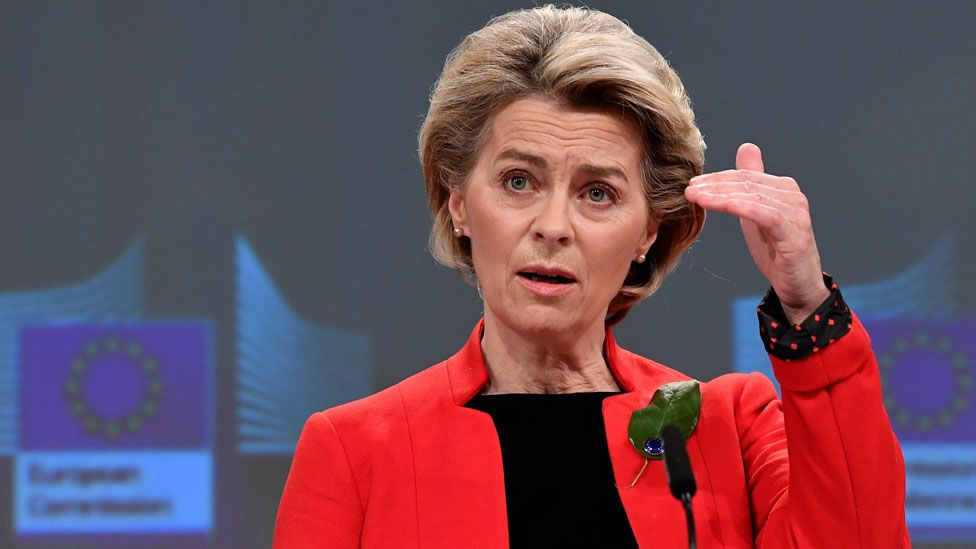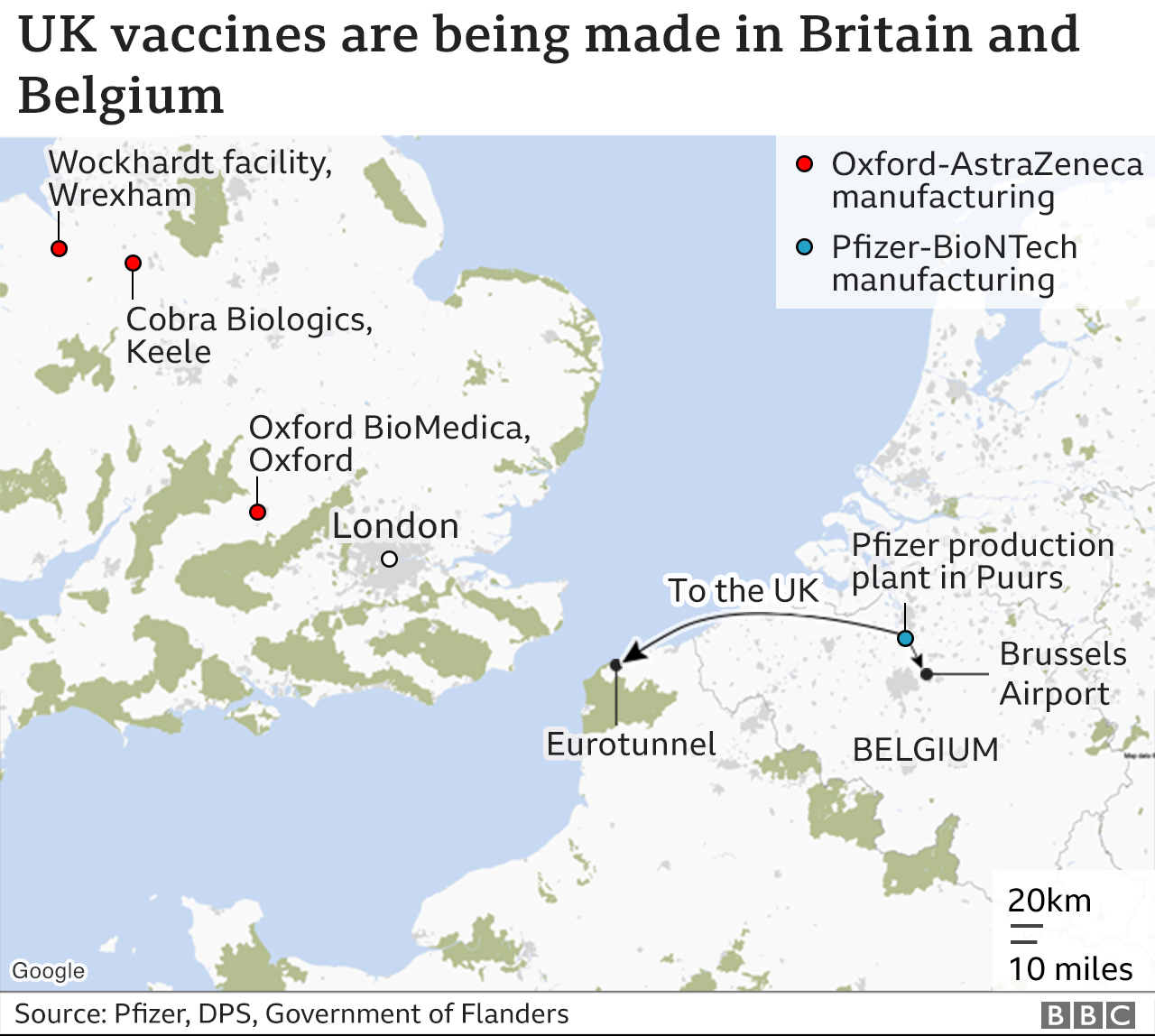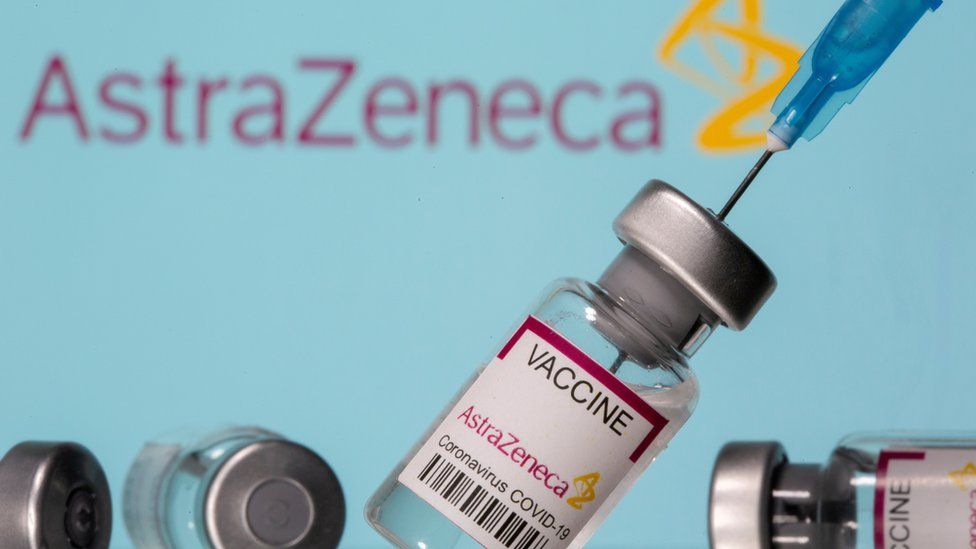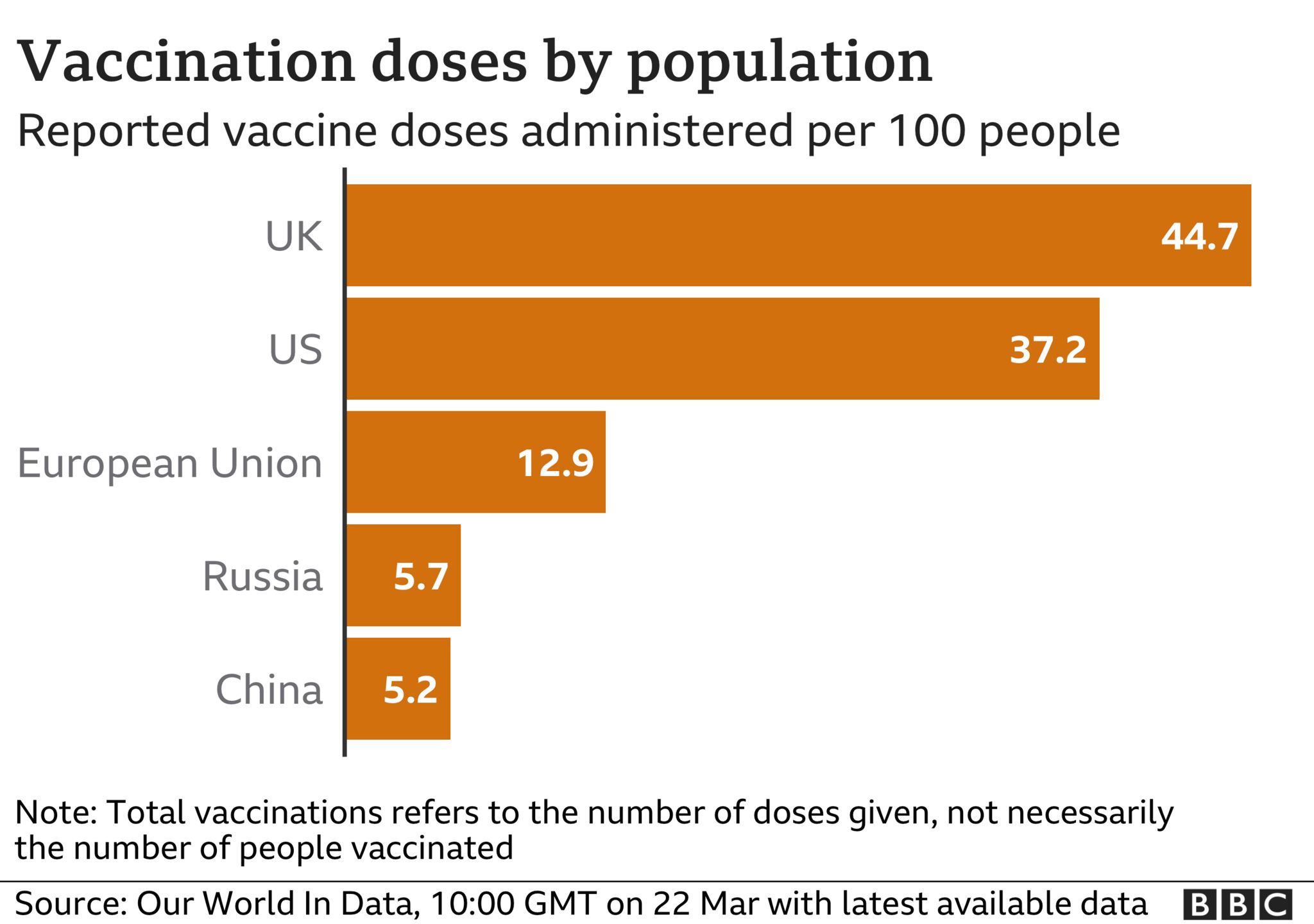
The European Union has warned it could ban exports of vaccines produced there, as it struggles to speed up its vaccination rollout.
European Commission President Ursula von der Leyen told AstraZeneca: "You fulfil your part of the deal towards Europe, before you start to deliver to other countries."
Where is the AstraZeneca vaccine made?
The Oxford-AstraZeneca vaccine is made in the UK at two sites: in Oxford and Keele. A third plant in Wrexham puts the vaccine into vials and packages it up for distribution.
The UK has ordered 100 million doses. Almost all will come from within the UK, but 10 million doses are being made by the Serum Institute in India.
Half of these have already been received, with half held up by delays.

The EU has ordered 400 million doses of the Oxford-AstraZeneca vaccine.
The company says supplies are coming mainly from the US and a site in Seneffe in Belgium. AstraZeneca is working with suppliers in 15 countries to make the vaccine.
A site in Leiden in the Netherlands is also producing some vaccine, although the pharmaceutical company said it was not significant.
AstraZeneca confirmed that the UK has not received any vaccines or components from the EU - apart from one "tiny" batch from the Leiden plant.
Who funded the AstraZeneca vaccine?
The Oxford-AstraZeneca vaccine was, as the name implies, chiefly funded by the university and the pharmaceutical company.
The research also received £65.5m in funding from the UK government.
There was some other investment, but a University of Oxford spokesperson said it was difficult to untangle, because of the way research is funded.
Why is the EU unhappy with AstraZeneca?
In January, AstraZeneca said it would have to cut the number of doses it could deliver to the EU. It blamed production delays in Belgium and the Netherlands.
This prompted criticism from the EU.
AstraZeneca said its agreement with the EU allowed the option of supplying Europe from UK sites, but only once the UK had sufficient supplies.

The full details of the company's deals with the UK and the EU have not been made public. But analysis by the Politico website points to a clause in the UK's contract which says the government "may terminate the deal and invoke what appear to be punishment clauses" if there is a delay in supply.
According to Politico, the EU waived its right to sue the company in the event of delivery delays. The European Commission says it is now involved in a "dispute mechanism" with the company.
Is the EU running out of AstraZeneca doses?
No - in fact, EU countries have been reporting hundreds of thousands of unused doses because of a drop in public confidence in the jab.
France and Germany have used only about half of the AstraZeneca jabs they have received, according to the European Centre for Disease Prevention and Control (ECDC).

As of 22 March, France has distributed 1.4 million out of 2.7 million doses available, while Germany received 3.4 million but has used only 1.8 million. The Netherlands has used only 38% of its supply.
In most other EU countries, the proportion of the unused AstraZeneca vaccines is much higher than the proportion of unused Pfizer jabs.
What about other vaccines?
The Pfizer jab is mostly made in Puurs in Belgium, and a manufacturing site has also been set up in the German town of Marburg.
The UK has ordered 40 million doses. The company says these deliveries are on track, but did not comment on whether they could be affected by an EU export ban.
In Europe, the Moderna vaccine is produced in Switzerland and put into vials in Spain - the UK has ordered 17 million doses.
The Janssen jab is made in the Netherlands - the UK has ordered 30 million doses.
Vaccines may be produced in one place but "filled and finished" - put into vials and prepared for export - in another.
And some components used in making the vaccine may be made at yet another location. For example, a UK company called Croda is supplying a component to Pfizer to make its vaccine.
The lipid components - fat molecules used to encase the virus's fragile genetic material and transport it into the body - are in relatively short supply, according to science data company Airfinity.
Can the EU ban vaccine exports?
The EU imposed export controls on coronavirus vaccines at the end of January. The measures will be in place until the end of June.
They were used for the first time in March, to stop a shipment of 250,000 doses of AstraZeneca vaccine, from Italy to Australia.
Ms von der Leyen has pointed out that more than 10 million doses of vaccine (Pfizer) produced in the EU have been exported to the UK.
The UK government has not been able to confirm whether any vaccines have gone the other way but insists a ban is not in place.
Prime Minister Boris Johnson has said: "I am reassured by talking to EU partners over the last few months that they don't want to see blockades."
https://news.google.com/__i/rss/rd/articles/CBMiIWh0dHBzOi8vd3d3LmJiYy5jb20vbmV3cy81NjQ4Mzc2NtIBJWh0dHBzOi8vd3d3LmJiYy5jb20vbmV3cy9hbXAvNTY0ODM3NjY?oc=5
2021-03-22 19:46:34Z
52781434532640
Tidak ada komentar:
Posting Komentar